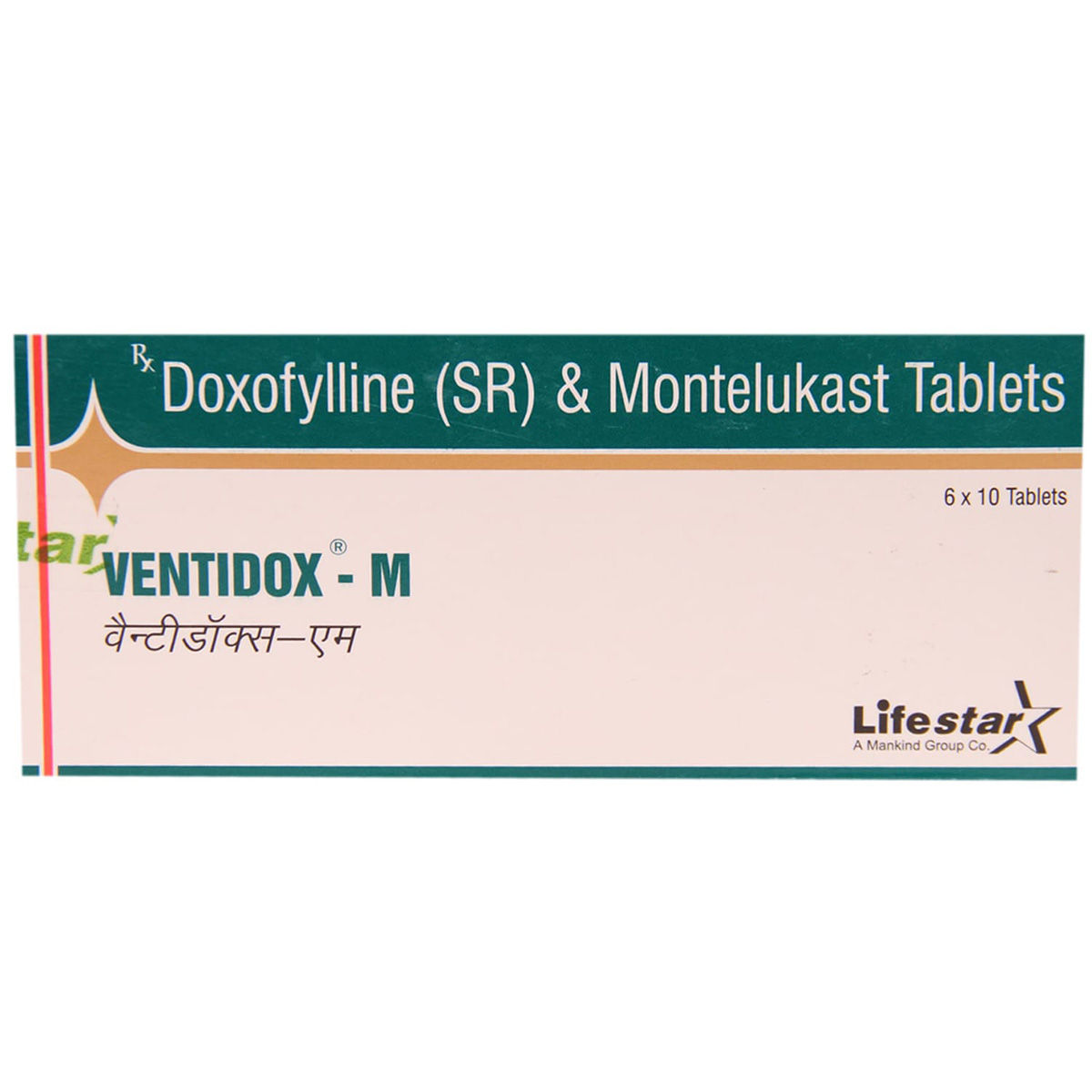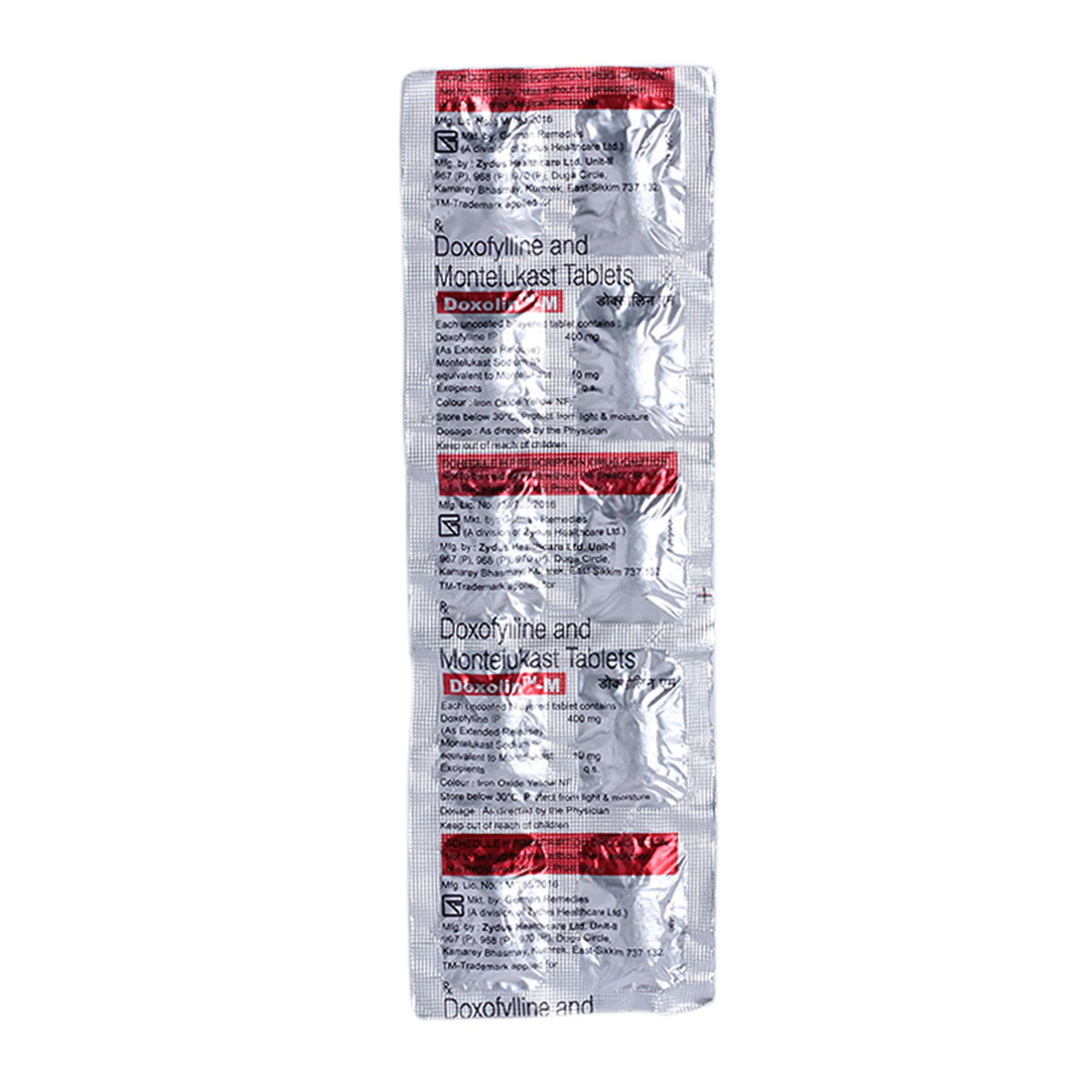Doxofylline+montelukast
About Doxofylline+montelukast
Doxofylline+montelukast is used to treat and prevent asthma and chronic obstructive pulmonary diseases (COPD). Asthma is a breathing problem in which airways narrow, swell and produce extra mucus, leading to difficulty breathing. COPD is a group of lung diseases that mainly include emphysema (shortness of breath) and chronic bronchitis (inflammation of the lining of your bronchial tubes).
Doxofylline+montelukast is a combination of two medicines: Doxofylline (bronchodilator) and Montelukast (leukotriene receptor antagonist). Doxofylline works by relaxing muscles and widening the airways of the lungs. It treats the airflow obstruction in the lungs, thereby relieving chest tightness, wheezing and cough to make breathing easier. Montelukast blocks the leukotrienes (chemicals released in response when a body comes in contact with an allergen), thereby reducing inflammation and swelling in the nose. It also inhibits bronchoconstriction (narrowing of airways in the lungs that lead to breathing difficulties).
Your doctor will advise the dose and duration of the course based on the severity of your disease. The common side effects of Doxofylline+montelukast include fever, nausea, vomiting, stomach pain/epigastric pain, headache, insomnia (difficulty in sleeping), irritation, sore throat, increased heart rate and flu-like symptoms. Most of these side effects of Doxofylline+montelukast do not require any medical attention and gradually resolve over time. However, if the side effects are persistent, please reach out to your doctor.
Doxofylline+montelukast is not intended for use during an acute asthma attack. Your doctor may suggest other medications for your sudden asthma attack. Please inform your doctor in advance if you have heart, liver, kidney and lung diseases, seizures (fits) and depression, phenylketonuria (birth defect caused by the build-up of an amino acid called phenylalanine in the body), hyperthyroidism (overactive thyroid), high blood pressure, stomach ulcers and viral infections before taking Doxofylline+montelukast. It is advisable to check with your doctor if you are pregnant, currently breastfeeding, or taking any other prescribed or non-prescribed medicines before starting Doxofylline+montelukast.
Uses of Doxofylline+montelukast
Medicinal Benefits
Doxofylline+montelukast is a combination of Doxofylline and Montelukast. Doxofylline works by relaxing muscles and widening the airways of the lungs. It treats the airflow obstruction in the lungs, thereby relieving chest tightness, wheezing and cough to make breathing easier. Montelukast blocks leukotrienes (chemicals released in response when a body comes in contact with an allergen) and reduces inflammation and swelling in the nose. It also inhibits bronchoconstriction (narrowing of airways in the lungs that lead to breathing difficulties). Montelukast is also used to relieve exercise-induced bronchospasm (shortness of breath that occurs only during exercise).
Directions for Use
Storage
Side Effects of Doxofylline+montelukast
- Fever
- Nausea
- Vomiting
- Stomach pain/epigastric pain
- Headache
- Insomnia (difficulty in sleeping)
- Irritation
- Sore throat
- Increased heart rate
- Flu-like symptoms
Drug Warnings
Do not stop taking this medicine of your own unless advised by your doctor. Before taking Doxofylline+montelukast, let your doctor know if have heart, liver, kidney and lung diseases, neuropsychiatric disorders like seizures (fits) and depression, phenylketonuria (birth defect caused by the build-up of an amino acid called phenylalanine in the body), hyperthyroidism (overactive thyroid), high blood pressure, stomach ulcers and viral infections. Doxofylline+montelukast is not intended for use during an acute asthma attack. Therapy with medicines like Montelukast should be cautiously administered in patients with neuropsychiatric disorders. Please seek medical advice if you are pregnant, currently breastfeeding, or taking any other prescribed or non-prescribed medicines before starting Doxofylline+montelukast.
Drug Interactions
Drug-Drug Interaction: Doxofylline+montelukast may interact with medicines used to treat gout (allopurinol), antacid (cimetidine), antibiotics (erythromycin, clindamycin,), drugs treating fits (phenytoin), asthma medicine (salbutamol) and influenza vaccine.
Drug-Food Interaction: Limit alcohol intake since it may increase the occurrence of side effects like drowsiness.
Drug-Disease Interaction: Before taking Doxofylline+montelukast, inform your doctor if you have heart, liver, kidney, and lung diseases, seizures (fits) and depression, phenylketonuria, overactive thyroid, high blood pressure, hypoxaemia (low oxygen levels in blood), stomach ulcers and viral infections.
Drug-Drug Interactions Checker List:
Safety Advice

Alcohol
cautionAvoid drinking alcohol while taking Doxofylline+montelukast to avail the maximum benefits and prevent the worsening of side-effects.

Pregnancy
cautionThere is limited data on how Doxofylline+montelukast affects pregnancy. Please consult your doctor if you are planning to conceive or already pregnant before starting Doxofylline+montelukast.

Breast Feeding
cautionThere is limited data on how Doxofylline+montelukast affects breastfeeding. Please consult your doctor before starting Doxofylline+montelukast.

Driving
cautionDo not drive or operate machinery if you experience drowsiness or difficulty in concentrating while using Doxofylline+montelukast. Doxofylline+montelukast may affect your ability to drive. Seek medical attention if the symptoms persist longer.

Liver
cautionDoxofylline+montelukast should be used with caution in patients with liver diseases. Let your doctor know if you have any history of hepatic impairment before taking Doxofylline+montelukast.

Kidney
cautionDoxofylline+montelukast should be used with caution in patients with kidney diseases. Let your doctor know if you have any history of kidney diseases. Your doctor will weigh the benefits and potential risks before prescribing Doxofylline+montelukast.

Children
cautionNo information is available for use in children. Hence, consult your paediatrician before giving Doxofylline+montelukast to your child.
Habit Forming
Diet & Lifestyle Advise
Add ginger to foods or tea as it contains some anti-inflammatory compounds that can relax membranes in the airways and reduce cough, irritation, and swelling in nasal passages.
Eat foods rich in potassium, such as tomatoes, bananas, asparagus, oranges, potatoes, avocados, dark leafy greens, and beetroot, as potassium is important for lung function and potassium deficiency may cause breathing problems.
Staying hydrated is vital for those with a cough or cold. Drink liquids at room temperature to get relief from runny nose, cough, and sneezing.
Do meditation, deep breathing, regular exercise, and try progressive muscle relaxation techniques to get relief from stress.
Quit smoking as it may reduce the effectiveness of the Doxofylline+montelukast and irritate the lungs worsening breathing problems.
It is advised to avoid contact with known allergens (allergy-causing agents), such as pollen, dust, etc. Also, certain food items are known to cause allergies to you.
Maintain personal hygiene and keep your surroundings clean.
Special Advise
Patients Concern
Disease/Condition Glossary
Asthma: It is a chronic (long-term) respiratory condition in which airways narrow, swell, and produce extra mucus, leading to difficulty in breathing. The symptoms of asthma include wheezing (whistling sound while breathing), shortness of breath, chest tightness, and cough, especially at night. The symptoms of mild persistent asthma may occur more than 2 times a week and up to 4 nights in a month, whereas, in the case of severe persistent asthma, the symptoms occur several times every day and most nights. The treatment for asthma includes medication, breathing exercises, and self-care.
Chronic obstructive pulmonary disease (COPD): It is a group of lung diseases with emphysema (shortness of breath) and chronic bronchitis (inflammation of the lining of bronchial tubes). The major cause of COPD is smoking tobacco. Also, long-term exposure to fumes and chemicals may lead to COPD. The symptoms include chronic cough, shortness of breath or wheezing (whistle sound while breathing).
FAQs
Doxofylline+montelukast is a respiratory medication primarily used to treat and prevent asthma and chronic obstructive pulmonary diseases (COPD).
Doxofylline+montelukast consists of Doxofylline and Montelukast. Doxofylline is a bronchodilator that works by relaxing muscles and widening the airways of the lungs. Montelukast is a leukotriene receptor antagonist that blocks leukotrienes (chemicals released in response when a body comes in contact with an allergen) and reduces inflammation and swelling in the nose.
Please take the missed dose as soon as possible. However, if it is time for the next dose, skip the missed dose and go back to your regular dosing schedule.
Doxofylline+montelukast is not recommended for use during a sudden asthma attack since it does not act right away. It is advised to please consult your doctor to prescribe a fast-acting inhaler for rescuing your sudden breathing problems.
Therapy with leukotriene receptor antagonists like Montelukast may worsen the symptoms of psychotic events in patients with a history of mental illness. Careful administration and monitoring are essential before taking Doxofylline+montelukast in patients with neuropsychiatric disorders. Please consult your doctor before taking Doxofylline+montelukast if you have been diagnosed or have a history of mental illness like depression, seizures (fits) etc.
It is essential to let your doctor know if you have any history of heart, liver, kidney, and lung diseases, neuropsychiatric disorders like seizures (fits) and depression, phenylketonuria (birth defect caused by the build-up of an amino acid called phenylalanine in the body), hyperthyroidism (overactive thyroid), high blood pressure, hypoxaemia (low levels of oxygen in the blood), stomach ulcers and viral infections before taking Doxofylline+montelukast.
Doxofylline+montelukast is usually taken in the evening for asthma and allergies, but the exact reason isn’t clear. Taking it in the evening helps control symptoms overnight and provides better relief throughout the next day.
No, the Doxofylline+montelukast is not a steroid. It contains Doxofylline (bronchodilator) and Montelukast (leukotriene receptor antagonist) that relieves asthma and allergy symptoms.
No, Doxofylline+montelukast doesn’t cause drowsiness, instead it causes insomnia (difficulty in sleep) as side effect. Consult the doctor if the side effect persists for long time.
Avoid alcohol consumption while using Doxofylline+montelukast. Intake of alcohol may increase the side-effects like drowsiness. Consult the doctor if you have any concerns regarding this.
Yes, though it’s rare, mood swings could result from taking Doxofylline+montelukast. Anxiety, impatience, aggressive behaviour are signs of mood swings. Suicidal thoughts and depression are also possible. Consult a doctor if you develop any of these side effects.
Yes, in very rare cases, Doxofylline+montelukast causes weird dreams, insomnia (difficulty in sleeping), and sleep walking. Consult your doctor if these symptoms worsen.
Take Doxofylline+montelukast as advised by your physician. Swallow it with water. Do not chew, break or crush it.
Limited information is available on use of Doxofylline+montelukast in children. Consult the children specialist before giving Doxofylline+montelukast to child.
If you have any liver or kidney problems, inform your doctor before taking Doxofylline+montelukast. You doctor will consider benefits and risks before prescribing Doxofylline+montelukast. Do not self-medicate.
The side effects of Doxofylline+montelukast include fever, nausea, vomiting, stomach pain, headache, insomnia (difficulty in sleeping), sore throat, and increased heart-rate. Most of these do not require any medical treatment. They will reduce by time. However, if these side effects persists, please consult the doctor.
Yes, you are recommended to consult your doctor before taking other medicines with Doxofylline+montelukast to avoid drug interactions. It may interact with other medicines to treat gout (allopurinol), asthma medicines (salbutamol), antibiotics (erythromycin), drugs treating fits (phenytoin).
If you think you have taken overdose of Doxofylline+montelukast, consult your doctor immediately. Do not exceed recommended daily dose.






